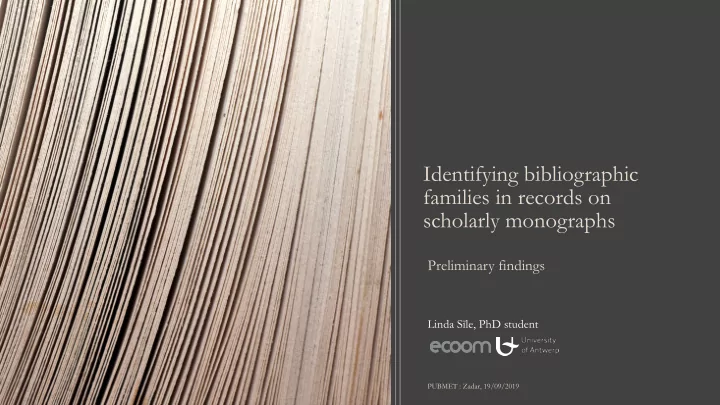

Identifying bibliographic families in records on scholarly monographs Preliminary findings Linda S ī le, PhD student PUBMET : Zadar, 19/09/2019
outline context and theoretical framework evaluative inquiry Functional Requirements for Bibliographic Records (FRBR) exploratory study
context and theoretical framework
evaluative inquiry numerical, verbal, and/or visual representations of scholarship that are meant to ‘ represent the complexity of actual practice and its engagements , rather than to reduce for the sake of standardization’ (Fochler and de Rijcke, 2017, p. 34)
1 title 10 ISBNs
Source: Zuccala et al. (2018)
books as bibliographic families (Zuccala et al. 2018, 151)
bibliographic families and Functional Requirements for Bibliographic Records (FRBR) work a distinct intellectual or artistic creation expression the intellectual or artistic realization of a work manifestation the physical embodiment of an expression of a work item a single exemplar of a manifestation (IFLA Study Group on the Functional Requirements for Bibliographic Records, 2009, p. 13)
exploratory study
Data sources Four national bibliographic databases for research output - COBISS (Slovenia) - CRISTIN (Norway) - CROSBI (Croatia) - VABB-SHW (Flanders, Belgium; VABB-1: only peer-reviewed, VABB-2: all others) Additional sources for metadata enrichment: - OCLC WorldCat - GoodReads
Datasets VABB: 3454 Timeframe: 2000-2017 Publication type: scholarly monograph VABB: COBISS 1451 8329 Authors: researchers in the social sciences and humanities 19’329 records (19’350 ISBNs) CROSBI 3769 CRISTIN 2404
How to incorporate complexity of books in book metrics? Approach step-by-step: - Delineate a dataset consisting of scholarly monographs in the social sciences and humanities - Generate a list of unique ISBNs (ISBN 13) - Retrieve from OCLC WorldCat additional ISBNs - Retrieve metadata for each ISBN from GoodReads - Identify and describe bibliographic families
Results for OCLC WorldCat Unit COBISS CRISTIN CROSBI VABB-1 VABB-2 Total*** Records identified in # 7835 2281 2713 1374 2310 16438 WorldCat ISBNs identified in # 7766 2253 2646 1320 2131 16018 WorldCat % 89 95 72 91 66 83 Additional ISBNs in # 3940 2907 1738 2534 2313 13394 WorldCat % 33 56 40 66 52 46 ISBNs in total # 11706 5160 4384 3854 4444 29412 83% of ISBNs identified in WorldCat 46% of all identified ISBNs retrieved from WorldCat
Number of ISBNs per record
Number of ISBNs per record: summary statistics Unit COBISS CRISTIN CROSBI VABB-1 VABB-2 Total*** ISBNs in total # 11706 5160 4384 3854 4444 29412 ISBNs per record Mean 1,5 2,2 1,2 2,9 1,5 1,7 Median 1 1 1 2 1 1 Min 1 1 1 1 1 1 Max 44 75 28 65 62 75 75 th percentile 1 3 1 4 1 2 95 th percentile 4 6 2 7 3 4 99 th percentile 9 9 5 12 8 9 Further exploration of dataset limited to records with 6 or more ISBNs (n=380)
Number of ISBNs identified in GoodReads Unit COBISS CRISTIN CROSBI VABB-1 VABB-2 Total*** ISBNs in total # 11706 5160 4384 3854 4444 29412 ISBNs identified in # 2915 2697 441 3009 1412 10415 GoodReads % 25 52 10 78 32 35 95% of records with 6 or more ISBNs (n=359) identified in GoodReads 72% of records (n=273) have >= 90% of ISBNs identified in GoodReads
What entity each ISBN refers to?
1 Globalization and Crime by Katja Franko 11 ISBNs
First edition Second edition Third edition 2013: 2020: 2007: Hardcover Hardcover Hardcover Paperback Paperback Paperback Ebook Ebook 2010: ebook
Conclusions Currently available metadata on scholarly monographs are not suitable for the use of ‘bibliographic families’ – FRBR framework typically is not used or not fully implemented – Diversity of bibliographic control practices for scholarly monographs Most titles published with 1 ISBN (!380 versus 19’329) Potential other uses of the notion ‘bibliographic family’: – Global visibility of local scholarly publishing (e.g. presence in WorldCat) – Historical case studies on specific author, title, etc.
Thank you! Linda.Sile@uantwerpen.be References Fochler, M. and de Rijcke, S. (2017), “Implicated in the Indicator Game? An Experimental Debate”, Engaging Science, Technology, and Society , Vol. 3, p. 21. IFLA Study Group on the Functional Requirements for Bibliographic Records. (2009), Functional Requirements for Bibliographic Records , International Federation of Library Associations and Institutions, Munich, p. 142. Zuccala, A., Breum, M., Bruun, K. and Wunsch, B.T. (2018), “Metric assessments of books as families of works”, Journal of the Association for Information Science and Technology , Vol. 69 No. 1, pp. 146–157.
Recommend
More recommend